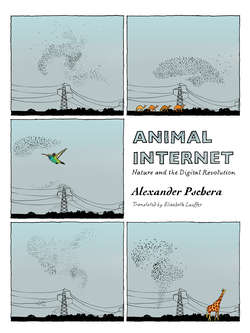Читать книгу Animal Internet - Alexander Pschera - Страница 8
На сайте Литреса книга снята с продажи.
FOREWORD
ОглавлениеEvery few decades, massive societal change occurs, sometimes without our being able to realize or even perceive it at the time. Walls or dictatorships fall, without anyone having seen it coming. Animal Internet brings this very kind of furtive, yet tremendous, global development to light—involving a total overhaul of our human understanding of nature. While nature has been conceptualized for centuries as separate from technology, the synthesis of nature and technology is currently fully underway. In the future, animals’ intelligent sensory systems may provide us humans with a trove of information about life on planet Earth that we need to survive. Humanity as a whole is thus being provided with a Seeing-Eye dog that will finally allow the nineteenth-century Prussian explorer and philosopher Alexander von Humboldt’s ideal of an understanding of nature to be realized or, as he put it, “to understand the world as a whole through the interplay of its constituent parts.”
Animal Internet: this is the shared, intelligent sensory network that has developed over the course of evolution, and that animals are now using to communicate with humans. This store of knowledge will become an inextricable part of the common cultural framework of humankind, right alongside libraries and museums and the Internet itself. We are in the process of incorporating a new dimension of knowledge into our lives—change like this happens once every few hundred years and is bound to cause unforeseeable upheaval. Wild animals will become our companions, like untamed and primal versions of our pets that we love and communicate with. The difference is that these wild animals will also warn us, and those humans living in the farthest flung places on Earth, of natural disasters; they will predict the climate; and they will measure chemical levels in the air, water, and soil for us.
Thus we humans will soon be in the agreeable position of understanding the world better through animal behavior, a practice shared by all advanced civilizations of the past. The fundamental improvement is that we will no longer observe only local animal behavior, like the Incas and the bristle worm in the coastal regions of Peru. The Incas used the invertebrate inhabitants of intertidal zones to forecast the weather since they started to migrate when water levels or temperatures changed. But in contrast to the pre-Columbian empire, we will essentially have a worldwide network of bristle worms, because there is no better information system than that of animals, informed as it is by the unparalleled diversity of their sixth sense.
Just as our children today cannot understand how anyone could ever have lived without the Internet, in only a few years we will not understand how humankind could have been so simpleminded—and perhaps technologically arrogant—as not to use the endlessly brilliant, perfectly evolved knowledge of the animal world. This book describes that fundamental change, which will be as important to our human sense of self as the discovery of life on other planets.
Dr. Martin Wikelski
Director, Max Planck Institute for Ornithology
